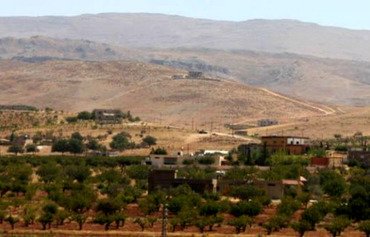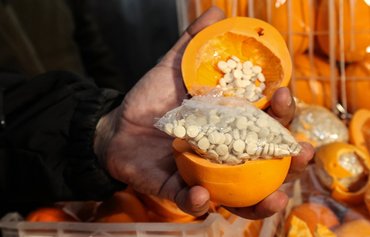The trafficking of Captagon has flourished amid the chaos of Syria's war, with amphetamine pills manufactured in Syria smuggled across illegal border crossings into Lebanon, which also has a thriving drug industry of its own.
Lebanese agencies have seized a number of large Captagon shipments in recent years, as they work to crack down on illegal drug manufacturing and smuggling.
Lebanese customs on July 2nd announced the seizure of a shipment of 3.7 million Captagon pills that had been concealed in fruit carts. Smugglers had been attempting to transport the pills across the border from Syria.
From Lebanon, they intended to export them to other countries in the region.
In another operation later that month, Lebanese forces foiled an attempt to smuggle more than four million Captagon pills, that had been concealed inside thermos barrels, out of the country.
Police also seized massive amounts of raw materials used in the manufacturing of Captagon from a warehouse in Baalbek.
In October 2016, Lebanon's General Directorate of General Security announced it had seized a large quantity of drug manufacturing equipment that a trader was attempting to bring into Lebanon.
This had been intended to equip four laboratories that manufacture the amphetamine base for Captagon, and would have given the manufacturers the capacity to produce millions of the pills each day, the directorate said.
Crackdown on drugs
"Captagon trafficking got worse as the Syrian crisis escalated," said Youth Against Drugs (JAD) president Joseph Hawat.
The quantities seized in Lebanon are only a fraction of the total, he told Al-Mashareq, as only an estimated 12% of the pills produced are seized worldwide.
The trade has flourished owing to the low cost of manufacturing the pills, which are exported outside Lebanon at high prices, he said.
"Those involved in the trade and manufacture of these pills are individuals who either belong to certain [political] parties or individuals these parties turn a blind eye to, either because they cannot control them, or because they belong to clans or families that support a certain political party," he said.
"Lebanon has become a Captagon manufacturing and exporting country," said researcher Mohammed Shamsuddin of Information International.
But "the increase in the number of seizures of these pills does not reflect the actual growth in the size of this trade", he told Al-Mashareq.
It rather signals the "increase in the effectiveness of the security agencies’ pursuit of traffickers and control of trafficking operations", he said, noting that in 2013, 15 million pills were seized, with that figure rising to 40 million in 2016.
An age-old industry
"The cultivation of contraband in Lebanon is an age-old practice," security expert and retired Lebanese military officer Brig. Gen. Naji Malaeb told Al-Mashareq.
It started with the cultivation of hashish (cannabis), followed by the introduction of opium, which produces heroin, which is cultivated in vast areas in the eastern Bekaa Valley, relatively far from the eyes of the Lebanese state, he said.
"Today, the manufacture of hallucinogens and mind-altering psychotropic drugs has evolved, and they are now manufactured with synthetic chemicals, as is the case with Captagon," he said.
"The same traffickers who were previously active in the drug trade are today involved in the new trade, and these people created a hotbed for themselves in the remote areas of the Bekaa," Malaeb said.
They imported equipment that can be operated inside homes and does not require large buildings, he said.
Syrian war fuels demand
The Syrian crisis helped grow this trade, Malaeb said, as "it is known that fighters tend to use narcotic pills to cope with the horrors of battle, sieges and fighting, so they constitute a lucrative market for these drugs".
Because of the proximity of the Bekaa Valley to Syria, the industry flourished there and expanded to outside the region as production grew, he added.
Security agencies are seizing large quantities, but it is still difficult to raid certain places where the drug is manufactured for several reasons, he said.
"The first is the proximity of those places to the border with Syria and the existence of illegal crossings controlled by Hizbullah," he said.
Secondly, Hizbullah fighters afford protection to drug traffickers in exchange for payment, he said, which represents a source of funding for the group.

![Syrian police display seized drugs and Captagon pills at the Drug Enforcement Administration in Damascus on January 4th, 2016. [Louai Beshara/AFP]](/cnmi_am/images/2018/08/17/14019-Syria-Lebanon-drugs-600_384.jpg)






